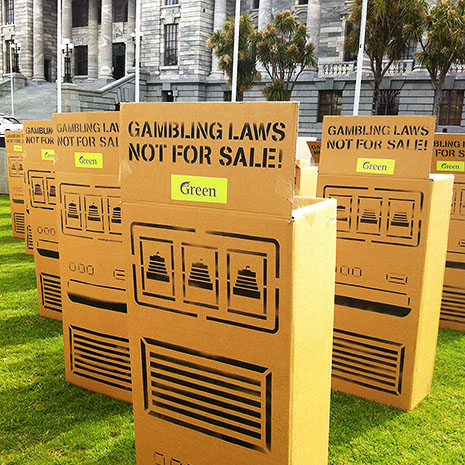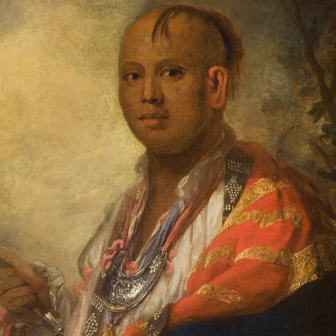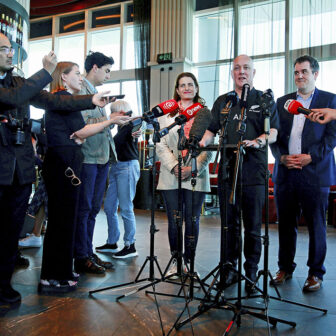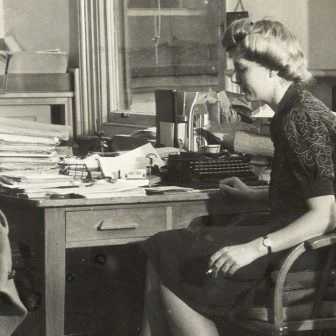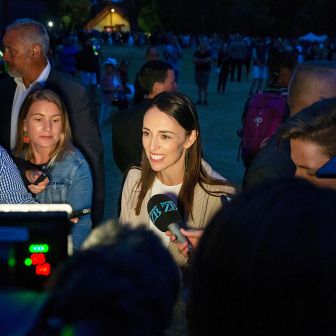Two forced ministerial resignations in the space of six months doesn’t necessarily drive a government from office. But in New Zealand’s case, the veteran politicians concerned are the leaders of the two minor parties whose support John Key needs for his National Party to stay in government. And despite the resignations, the colourful scandals plaguing the government haven’t gone away.
First to fall on his sword was Peter Dunne, leader of the centrist United Future, who resigned as revenue minister in June. Four months later, John Banks, leader of the libertarian ACT party (originally the Association of Consumers and Taxpayers), was forced to step down as regulatory reform and small business minister.
Dunne and Banks, who still sit in parliament, are fixtures on New Zealand’s political landscape. Dunne was first elected as a Labour MP nearly thirty years ago, and served in a Labour ministry before splitting with the party. Banks was a National MP during 1981–99 and police minister in Jim Bolger’s National government. But while the two MPs have high personal profiles, the parties they lead are barely visible. Between them, United Future and ACT won less than 2 per cent of the vote at the last election in 2011, and Dunne and Banks are their sole MPs.
But that doesn’t make them any less vital to John Key’s future. Whatever their indiscretions, Key can’t completely distance himself from the pair because National – as the party is known among New Zealanders – holds only fifty-nine of the 121 seats in parliament.
It’s uncannily like the situation in Canberra over the past three years. In Australia’s political history, that may stand as a novel and ill-fated period, but across the Tasman coalition-building and minority governments are a fact of life. Since New Zealand introduced its mixed-member proportional voting system in 1996, no party has won a clear majority at a general election.
Ostensibly, at least, the resignations of Dunne and Banks are unrelated. But you don’t need to poke around too much in the messy entrails of New Zealand politics to turn up a link. In different ways, Dunne and Banks are caught up in a tangle of scandal and intrigue that takes in New Zealand’s top internet mogul, illegal phone taps, dawn police raids, undeclared political donations, the SkyCity casino and mayoral politics in the city of Auckland. In fact, when you start pulling at the loose threads, it seems almost everything in New Zealand politics is connected.
The largest of the larger-than-life figures in this drama is Kim Dotcom, a German-born entrepreneur and multimillionaire, who has become something of a folk hero since taking up residence in New Zealand a few years ago. Regularly described as “flamboyant” in the local media, Dotcom (who changed his name from Schmitz in 2005) champions cheap, fast broadband, and minimal rules and maximum personal privacy on the internet. He frequently generates headlines by doing things like holding marathon gaming challenges to raise money for charity, toying with setting up his own political party, and offering to fund Team New Zealand’s next America’s Cup challenge if the government fails to stump up the money.
Dotcom made his fortune as the founder of the Hong Kong–based file-hosting service Megaupload.com. He is a primary target of the US Department of Justice, which has been seeking to extradite him to face a raft of serious charges related to his online business, including racketeering, money laundering and conspiring to commit copyright infringement. In January 2012, after indictments were filed in the United States, a squad of seventy-six New Zealand police backed by two helicopters launched a dawn raid on Dotcom’s mansion. He was arrested and his assets were seized. Six months later, New Zealand’s High Court ruled that the police warrants for the raid were unlawful.
It subsequently emerged that Dotcom had been subjected to illegal spying by New Zealand’s foreign intelligence service, the Government Communications Security Bureau, or GCSB, in advance of the raid. The surveillance had been carried out at the request of the police, even though the GCSB is not permitted to spy on New Zealand citizens and permanent residents like Dotcom. A high-level review into the GCSB’s activities identified another eighty-five people who may have been spied on illegally.
An indirect casualty of the Dotcom affair was United Future’s Peter Dunne. After the review of the GCSB’s dodgy snooping was leaked to the media, an investigation into that security breach revealed that Dunne had been engaged in an intensive email exchange with the journalist who broke the story. Dunne denies that he leaked the document to her, but after he refused to reveal much of the content of the eighty-six emails the pair exchanged in the two weeks prior to the scoop, he had no alternative but to resign his portfolio.
As the political and legal fallout from the illegal surveillance, raid and arrest of Kim Dotcom continues, the turbulence has buffeted the prime minister. Key was forced to make an embarrassing apology to Dotcom and has come under sustained attack for his legislative response to the GCSB’s indiscretions. Rather than rein in the spy agency, he introduced two bills to extend its powers. Under the legislation, the bureau will be able to seek warrants to intercept the communications of New Zealanders and to demand that telecommunications firms and internet companies hand over their customers’ private information.
The New Zealand Law Society, the Human Rights Commission and the Privacy Commission all voiced concerns about the measures, as did global technology companies like Google, Facebook and Microsoft. Kim Dotcom was also a prominent critic. Despite the protests, the Key bills passed into law by a vote of sixty-one to fifty-nine in parliament. Support from Peter Dunne and John Banks was essential – without the votes of these two MPs, the GCSB would not have got its new powers.
In the context of global concerns about the United States snooping on its friends and allies, Key’s decision to beef up the GCSB’s powers has not won him many friends in the electorate. The prime minister insists that New Zealanders have nothing to fear from the spy agency’s surveillance capacity, yet he has demonstrated acute sensitivity to having his own private conversations recorded.
During campaigning for the 2011 election, John Key made a big show of meeting with ACT’s John Banks in an Auckland cafe. By inviting the media to witness their chat over a cup of tea, the prime minister gave John Banks’s electoral prospects a significant boost – despite the fact that Banks’s main rival in the Epsom electorate was a candidate from Key’s own party.
Manoeuvrings of this kind aim to maximise political advantage under New Zealand’s electoral system, where voters cast two ballots, one for their preferred party and one for an individual candidate to represent their electorate. As commentator Jane Clifton put it in New Zealand’s venerable Listener magazine, Key was asking National’s “blue-ribboned voters to peg their hooters and vote for Banks” in order to boost overall seat numbers on the conservative side of politics.
After Key and Banks had chatted publicly for the cameras, journalists were asked to leave the cafe so they could have a private chinwag over a cup of tea. One media representative, however, left his equipment running – whether inadvertently or deliberately is a matter of contention – and the politicians’ entire conversation was recorded. Media outlets did not publish or broadcast the material, but the content of their talk soon became widely known. Furious, John Key referred the matter to the police, a move even some of his political allies described as “a ridiculous over-reaction.” With concerns about media freedom intensifying, the matter ended up in the High Court.
When the teapot tapes eventually found their way onto the internet, they confirmed reports that Key and Banks had engaged in disparaging jokes about the generally silver-haired supporters of the rival party New Zealand First, describing them as “dying out.” The party is led by another of New Zealand’s maverick political survivors, Winston Peters, and the free publicity from the teapot tapes probably helped to resuscitate his political fortunes and return his party to parliament after an absence of three years. Key’s teatime chat – the official version, in front of the cameras – also helped John Banks to win his seat, and Banks then became a member of Key’s ministry.
Until mid October, that is. As with Dunne’s resignation, internet millionaire Kim Dotcom again played a starring role in the drama, and in this case the connection was more direct.
In 2010, John Banks was mayor of Auckland, by far New Zealand’s biggest city, and was preparing to make a tilt for re-election. The stakes were high. The 2010 mayoral race was the first to be held after the amalgamation of all municipalities in the Auckland region into a single governing body. This created a “supercity” covering about one-in-three New Zealanders. The job of mayor had become the most potent seat of political power outside the cabinet.
Banks needed campaign funds and Kim Dotcom obliged. Dotcom says he wrote Banks a cheque for NZ$50,000 because he “kind of liked the guy” and was “happy to help.” He says that Banks then asked him to split the money into two amounts of NZ$25,000 in order to make it easier to keep the donation anonymous.
Under campaign finance laws in New Zealand, candidates must disclose donations if they know the source of the funds. Banks disputes Dotcom’s story and protests his innocence, but despite his assertions that he has “nothing to hide, nothing to fear” and his repeated if somewhat curious insistence that he did not “come up the river on a cabbage boat,” Banks’s public responses to the allegations appear evasive and inconsistent. Initially he claimed that he barely knew Dotcom, but video footage of the millionaire’s birthday shows Banks proposing a toast in his honour. Then there is evidence that Banks enjoyed a ride to Dotcom’s mansion in the businessman’s private helicopter, and that Dotcom donated NZ$500,000 to pay for Auckland’s New Year’s eve fireworks display while Banks was mayor.
The Dotcom donation is not Banks’s only campaign finance problem. The boss of Auckland’s SkyCity casino has told a court that he personally handed Banks a donation of NZ$15,000 to help his 2010 mayoral campaign. This donation wasn’t declared either, and again Banks claims that he was not aware of the source of the money.
Banks’s SkyCity donation has proved to be something of a time-bomb for the Key government, because it tarnished a deal struck with the casino that will allow it to dramatically expand its gambling operations. The casino will get a twenty-five-year extension to its licence and the right to bring in 230 more poker machines, forty extra gaming tables and new cashless technology in return for building a NZ$400 million convention centre. The agreement requires legislative backing, and Banks’s support will be needed to get the bill through. The Greens are demanding that he abstain from voting because he is “hugely conflicted.”
When initial police inquiries into Banks’s handling of campaign donations failed to recommend prosecution, the issue was pursued in the courts by retired accountant and legal activist Graham McCready, who has a track record of prosecuting politicians. McCready, who helped convict a Labour MP of assaulting a political rival in the parliament, operates from a council flat and has himself been bankrupted and convicted of filing false tax claims. He says that he sees it as his civic duty to hold public officials accountable.
After McCready’s initial spadework revealed the extent of the evidence building against Banks, the solicitor-general took over the prosecution and the matter has now been committed to trial. If Banks is found guilty he will be disqualified from parliament. This would force a by-election that could conceivably bring down John Key’s government. As with the prosecution of former Labor MP Craig Thomson in Australia, though, the wheels of justice are unlikely to turn swiftly enough to produce a verdict before the next election, particularly as Banks is appealing the decision to send him to trial.
Whatever the outcome in his case, the long political career of John Banks appears to be approaching its end. Peter Dunne also appears highly unlikely to survive the next election. As columnist Jane Clifton puts it, this leaves John Key’s National party looking “increasingly desperate and dateless.” National’s other support in parliament comes via a deal with three Maori Party MPs to guarantee supply and back the government in confidence motions. There is no guarantee the Maori Party will retain those seats at an election, or be willing to make the same agreement in a new parliament.
Meanwhile, after a period wracked by internal division, New Zealand Labour appears to have united behind its new leader, David Cunliffe. The party’s national conference this month was hardly inspiring or visionary, but it went off without much controversy or any obvious brawling. Key remains a far more popular leader than Cunliffe, and National still rates significantly better than Labour in opinion polls, but if Labour’s votes are combined with the Greens then a change of government appears possible.
And given that there is still a year to go before the next general election, there could be a great deal more upheaval to come. In New Zealand, the political ground is far from stable. •
Peter Mares is contributing editor of Inside Story and an adjunct fellow at the Swinburne Institute for Social Research.
Sex in the supercity
A lack of transparency in campaign funds isn’t the only controversy to hit town-hall politics in Auckland. In 2010, despite financial help from Kim Dotcom and the SkyCity casino, John Banks was defeated in his bid to become mayor of the new supersized city by Len Brown, a left-leaning lawyer with a long record in local government and community activism.
Around the same time that Banks was announcing his resignation as a minister in John Key’s National government in mid-October (see main article), Brown was re-elected for a second term as mayor with a thumping majority. Celebrations were short-lived. Just days after the election, Brown was fronting the media to apologise for inflicting “harm and shame and humiliation” on his wife and daughters, after a conservative blogger exposed his two-year affair with a much younger woman.
“Exposed” is putting it mildly: blogger Cameron Slater had convinced Brown’s lover, Bevan Chuang, to sign an affidavit in which she gave the minutiae of their liaisons – details of where and when they had sex, smutty phone conversations and cheap gifts of lingerie, together with an unflattering assessment of Brown’s sexual performance. Slater published the account in full on his website Whale Oil Beef Hooked (a name that makes slightly more sense when pronounced with an Irish accent).
As the political backstory emerged, though, the story became even murkier. Cameron Slater, the blogger who revealed the affair, is the son of former National Party president John Slater. Slater senior managed the campaign of the man Brown defeated in this year’s mayoral election, businessman John Palino. Slater junior admits that another man who worked on the Palino campaign, Luigi Wewege, alerted him to Brown’s affair with Chuang.
The woman at the centre of the scandal, Bevan Chuang, now claims that a few days before she made her affair with Brown public, John Palino met her late at night in an Auckland car park. In a conversation lasting an hour and a half, she says Palino encouraged her to sign an affidavit about her relationship with Brown so that Palino could use it to “talk to the mayor… and say that if he does not want this information out, he should step down and maybe perhaps say that he’s got a health problem and cannot do this job anymore.”
Palino admits to meeting Chuang, but says their conversation was about threatening text messages they had both received.
